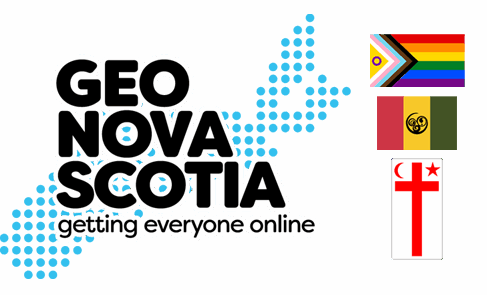Access to the Internet has become a necessity for daily life but not all Nova Scotians can afford it.
Building on the grassroots success of 2020’s GEO Project, over 70 partner organizations are now working together through GEO Nova Scotia, finding effective ways to provide affordable devices and internet access for people with low income, as well as the skills and confidence to be successful online.
Together, we’re developing an accessible model to continue building toward these goals over the long-term. By opening up the digital world to more of our population, they’ll have better access to:
- Education
- Primary health services
- Mental health and addictions services
- Employment opportunities
- Commerce
- Social connections and more
The time for action is now, as we work to close the social and economic divide that comes from digital exclusion. A post-pandemic recovery must include our vulnerable populations or else the barriers that already exist will get bigger and people will fall even further behind.
The digital transformation of our world is already well underway, and we’re making sure everyone has their part in it, because we all belong online.
Current Situation
Lack of internet access in Nova Scotia is not just an issue of rural connections. Even when it’s available, home internet access and computers are unaffordable to many Nova Scotians.
- More than 20,000 Nova Scotians have no home internet because they simply can’t afford it. (Canadian Internet Use Survey, 2020)
- Access to the internet is lower among vulnerable communities including people living with a disability, people who identify as aboriginal, and people who are unemployed. (Canadian Internet Use Survey, 2020)
- Low-income households spend almost twelve times as much of their income per person on communication compared to high-income households (6.2% vs 0.53%). (Statistics Canada’s Survey of Household Spending)
- Many Nova Scotians do not have the skills or confidence to effectively use the internet.
- The digital divide is growing every day – creating social and economic barriers that will be difficult or impossible to overcome.
- Data shows that the most vulnerable in society, core-age women in low-wage jobs, marginalized populations and youth, were the hardest hit and are expected to experience the longest recovery. (Statcan March 2021)
- For these groups, differences in the ability to work from home not only contributed to higher earnings inequality but also highlighted the deep impact of the digital divide. (Statcan March 2021)
GEO Nova Scotia defines success as Digital Inclusion for all.
- Everyone has affordable access to the internet.
- Everyone has an affordable device to get online.
- Everyone has the basic digital skills and confidence they need to be online.
How do we succeed? With Collective Impact and GEO Nova Scotia!
- Partners from the Public Sector, the Private Sector, and the Community Sector, working together making GEO Nova Scotia the centre of our collective work on Digital Inclusion.
- Develop and scale models that provide high-speed home internet service and appropriate devices at costs geared to income.
- Develop and scale a Digital Champions model that delivers one-on-one basic computer skills training to everyone who needs it, leveraging existing structures within the Public Sector and Community Sector.
Together, the GEO Nova Scotia Coalition has developed a proven recipe for success in the short-term, while establishing the breadth and depth of relationships needed to create scalable and sustainable success in the long-term.
GEO Nova Scotia uses a collective, multi-sector approach, leveraging partnerships and economies of scale to minimize cost and maximize impact.
Before the pandemic, I could only access the internet in public spaces. It made me feel like a second-class citizen. When that was taken away, I didn’t feel like a citizen at all.” – GEO Participant
“[One resident] did a whole bunch of training online, and now she is working full time because of having access to the internet.” – GEO Referral Partner
“It saved my life.” – GEO Participant
Transforming lives through digital inclusion
